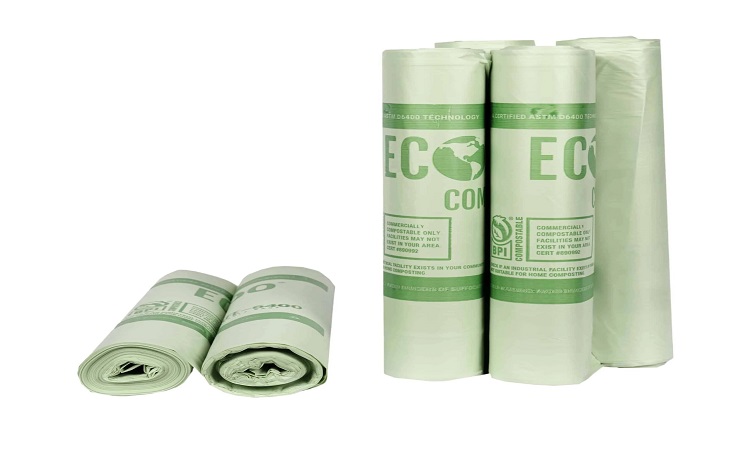Eco-Friendly Waste Management: Biodegradable Garbage Bags

Are you tired of contributing to the ever-growing piles of non-biodegradable waste? Want to make a positive impact on the environment without compromising on convenience? Look no further than biodegradable garbage bags! These innovative alternatives to traditional plastic bags are taking the waste management world by storm. In this blog post, we will delve into what makes biodegradable garbage bags so special, how they differ from their counterparts, and why making the switch can benefit both you and Mother Earth. So let’s dive in and discover the wonders of eco-friendly waste management with biodegradable garbage bags!
What are biodegradable garbage bags?
Biodegradable garbage bags are a game-changer when it comes to waste management. Unlike traditional plastic bags that take hundreds of years to decompose, these innovative alternatives are designed to break down naturally and safely within a relatively short period of time. Made from plant-based materials such as cornstarch or vegetable oils, biodegradable garbage bags offer a sustainable solution for disposing of household waste.
These bags are engineered with an additive that accelerates the decomposition process, allowing them to degrade into organic matter and eventually return back to the environment without leaving behind harmful residues. This means less pollution and less strain on landfills, which is great news for our planet.
Not only do biodegradable garbage bags help in reducing environmental impact, but they also come in various sizes and strengths just like their non-biodegradable counterparts. So you don’t have to compromise on capacity or durability when making the switch.
It’s important to note that not all “biodegradable” claims are created equal. Look for certifications such as BPI (Biodegradable Products Institute) or ASTM D6400 on the packaging to ensure that you’re purchasing genuine biodegradable garbage bags.
By choosing biodegradable garbage bags over traditional options, you can actively contribute towards promoting sustainability while still maintaining convenience in your daily life. It’s a simple yet impactful choice that helps protect our planet for future generations.
How are biodegradable garbage bags different from traditional garbage bags?
Biodegradable garbage bags have gained popularity in recent years due to their eco-friendly nature. But what exactly sets them apart from traditional garbage bags? Let’s delve into the key differences.
First and foremost, the material used to make biodegradable garbage bags is derived from renewable resources such as plant starches, vegetable oils, or compostable polymers. This means that they are made using sustainable materials and do not contribute significantly to environmental pollution.
On the other hand, traditional garbage bags are typically made from non-biodegradable substances like polyethylene or plastic. These materials take hundreds of years to decompose in landfills, leading to long-lasting harm on our planet.
Another important difference lies in how these two types of garbage bags break down over time. Biodegradable bags undergo a natural process where microorganisms present in soil or water can break them down into harmless substances like carbon dioxide and water. In contrast, traditional garbage bags remain intact for an extended period without decomposing naturally.
Furthermore, biodegradable garbage bags offer an alternative solution for waste management systems that prioritize sustainability. By opting for these environmentally friendly options, individuals and businesses can reduce their carbon footprint and contribute towards a greener future.
It is evident that biodegradable garbage bags stand out from traditional ones due to their composition and decomposition process. The use of renewable materials combined with their ability to break down naturally makes them a more responsible choice for waste disposal needs.
What are the benefits of using biodegradable garbage bags?
Using biodegradable garbage bags offers several benefits that make them a better choice for waste management. These bags are made from natural materials that can be broken down by microorganisms over time. This means that when disposed of properly, they will not contribute to the growing problem of plastic pollution in landfills and oceans.
Biodegradable garbage bags help to reduce greenhouse gas emissions. Traditional plastic bags take hundreds of years to decompose, releasing harmful gases into the atmosphere during this process. In contrast, biodegradable bags break down much faster and produce fewer emissions.
Another advantage is that biodegradable garbage bags are safer for wildlife. Animals often mistake traditional plastic as food and end up ingesting it, leading to serious injuries or death. By using biodegradable options, we can help protect animals from harm.
Furthermore, these eco-friendly bags promote sustainable practices and responsible consumerism. By choosing products made from renewable resources rather than non-renewable ones like petroleum-based plastics, we support industries that prioritize environmental preservation.
Using biodegradable garbage bags sets a positive example for others and helps raise awareness about the importance of reducing waste and protecting our planet’s ecosystems.
The benefits of using bags include reducing plastic pollution in landfills and waterways, minimizing greenhouse gas emissions,
protecting wildlife from harm,
promoting sustainability,
and inspiring others to adopt eco-friendly practices.
What are the disadvantages of using biodegradable garbage bags?
While bags have their benefits, it’s essential to consider the potential disadvantages before making the switch. One drawback is that they can be more expensive than traditional plastic bags. The cost of producing biodegradable materials and implementing eco-friendly manufacturing processes often leads to higher prices for consumers.
Another issue with biodegradable bags is their durability. Since these bags are designed to break down easily, they may not be as sturdy or long-lasting as conventional plastics. This means that they might tear or leak more easily, potentially causing a mess during disposal.
Additionally, there can be confusion around composting and recycling practices when it comes to bags. While these bags are meant to break down in a composting environment, many municipal waste management systems do not have specialized facilities for processing them correctly. As a result, they may still end up in landfills where they won’t decompose efficiently.
Furthermore, some studies suggest that the production of certain types of biodegradable plastics requires large amounts of energy and resources compared to traditional plastics. This raises concerns about the overall environmental impact associated with their production.
It’s important to weigh both the advantages and disadvantages when considering whether or not to use bags in your waste management routine. Understanding these drawbacks allows individuals and communities alike to make informed decisions regarding sustainable waste disposal practices without compromising convenience or effectiveness.
Conclusion
In today’s world, where environmental sustainability is a top priority, it is crucial to adopt eco-friendly waste management practices. One such practice is using bags. These innovative bags offer numerous benefits over traditional plastic bags and contribute to a healthier planet.
Biodegradable garbage bags are specifically designed to break down naturally over time, minimizing their impact on the environment. Unlike traditional plastic bags that can take hundreds of years to decompose, biodegradable options typically degrade within a few months or years.
By choosing bags, you are reducing your carbon footprint and helping to combat the growing landfill crisis. These bags not only minimize pollution but also promote sustainable waste disposal methods like composting or recycling.
The benefits of using bags extend beyond their environmentally friendly nature. They are often made from renewable resources such as plant-based materials like cornstarch or sugarcane, making them an excellent alternative for those looking for sustainable options.
Additionally, these bags are just as durable and reliable as traditional plastic ones. You don’t have to compromise on quality when opting for an eco-friendly choice. Biodegradable garbage bags can still handle heavy loads without tearing or leaking.
However, it’s essential to note that there may be some drawbacks associated with using bags. For instance, they tend to be more expensive than regular plastic options due to production costs and limited availability in some areas.
Furthermore, while these bags break down under specific conditions like exposure to sunlight or moisture found in composting facilities, they may not degrade as quickly in landfills where oxygen levels are low. This means that proper disposal methods should be followed to maximize their environmental benefits fully.






